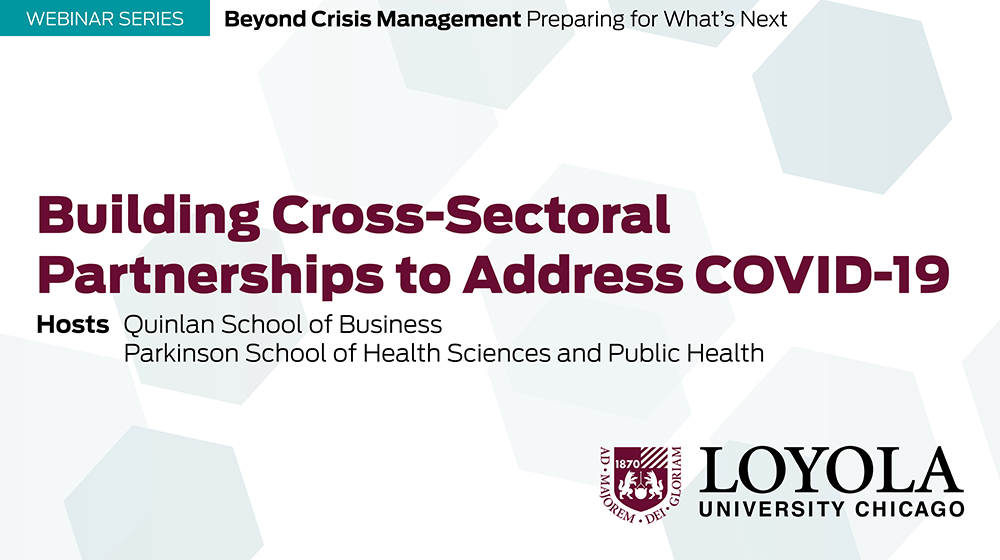Cross-sectoral Responses to COVID-19

The "Building Cross-Sectoral Partnerships" webinar explored how cross-sectoral strategies are key to addressing the impacts of COVID-19.
Partnerships across sectors will be critical for responding to COVID-19, said business and nonprofit leaders during the first webinar of the new series Beyond Crisis Management: Preparing for What’s Next in Addressing COVID-19.
The series is hosted by Loyola’s Quinlan School of Business and Parkinson School of Health Sciences and Public Health.
The first webinar, “Building Cross-Sectoral Partnerships,” explored key strategies from the perspective of three leading Chicago organizations: Skills for Chicagoland’s Future, the United Way of Metro Chicago, and the Civic Consulting Alliance.
Watch the webinar below:
Key strategies
Seth Green, founding director of Loyola’s Baumhart Center, set the framework for the conversation, saying that the three featured organizations developed cross-sectoral partnerships and strategies prior to the pandemic and now are able to create an even greater impact amid this moment.
Below are three key strategies that emerged from the discussion.
1. Build on existing relationships
According to Sean Garrett, president & CEO of United Way of Metro Chicago, a cross-sectoral model not only enabled United Way to thrive prior to COVID-19 pandemic, but it also allowed Chicago to respond quickly to the pandemic.
“We, along with the Mayor's Office and the Chicago Community Trust, came together and said, ‘We think there's an opportunity to bring together resources that can be quickly deployed.’ We knew that there needed to be a way for resources to come together and get out quickly to organizations who are doing work in or across our region,” Garrett says.
In addition to partnerships among business, government, and nonprofits, relationships with the general public were vital, too.
Funding the relief efforts requires “a cross-section of our community. You've got businesses that are making investments, you've got foundations that are making investments, but you also have folks that are making twenty- and ten-dollar investments. This is something where the whole community is coming together,” says Garrett.
Civic Consulting Alliance CEO Rebekah Scheinfeld says part of her organization’s foundation is to build relationships between the public and private sector. Now that those relationships are more vital than ever before, the firm is in a special position to “align our support and long-term investments across both the public and private sector.”
2. Lean into innovation and new partnerships
While building on existing relationships is critical, so are innovation and expansion of partnerships.
“This is a great opportunity to leverage the platforms that we have for partnership and bring in a diverse set of partners,” says Scheinfeld.
Garrett agrees, noting, “In the last six weeks, an incredible number of new capacities have been built. New partnerships are forming every day. Organizations are doing things that they've never thought about doing. Instead of letting things get in their way, [organizations] are innovating and responding to what they need to do. We’re innovating faster than we ever had.”
Daniel Cervantes, senior vice president for Skills for Chicagoland’s Future and Baumhart Scholar, says his organization’s ability to be flexible and adapt with its partners has proven to be invaluable.
“I think this gets at the heart of…how there has to be an ability to quickly be agile and adapt to the new environment which were in. We're working with businesses and nonprofits and sort of combining a more holistic approach.”
During COVID-19, Skills for Chicagoland’s Future has focused on addressing massive rates of unemployment by training unemployed individuals for available jobs by teaming up with both the public and private sectors. “We’re adapting to whatever the need is,” says Cervantes.
Garrett adds, “The opportunity is how do we keep building innovation. We need to stick with this instead going back to something that wasn't working before.”
3. Move toward systemic change while addressing COVID-19
Garrett began his remarks by reminding the audience of the economic disparity in Chicago. People of color are more likely to have lower household wealth, educational access, food access, life expectancy, and more. In the context of COVID-19, they also have less access to healthcare.
“The way our community is structured depends on where you are born,” says Garrett of United Way. “Simply being born on the West and South sides of our city puts you at greater odds” for COVID-19.
United Way has investing in and building partnerships in these communities for years. The centers United Way partners with are now helping their communities respond to COVID. Garrett believes this infrastructure will allow communities to not simply manage COVID-19, but also to thrive after the pandemic.
Scheinfeld adds, “We have a mandate that this also be an inclusive community. We can't go back to the pre-COVID normal, because that wasn't working for many people in our community.” This is the time to “leverage the partnerships we have and catalyze that for better communities.”
When shifting the focus from response to recovery, there must be a deep systemic recovery, she says.
Loyola as resource
Quinlan dean Kevin Stevens and Parkinson dean Elaine Morrato offered the help of Loyola and its colleges to address challenges associated with the pandemic.
“We have a wealth of expertise on using data to make decisions or management during crisis and we want to share,” says Stevens. “We have faculty and staff who are eager to help. We're all in this together.”
Please email Stevens or Morrato with questions.
